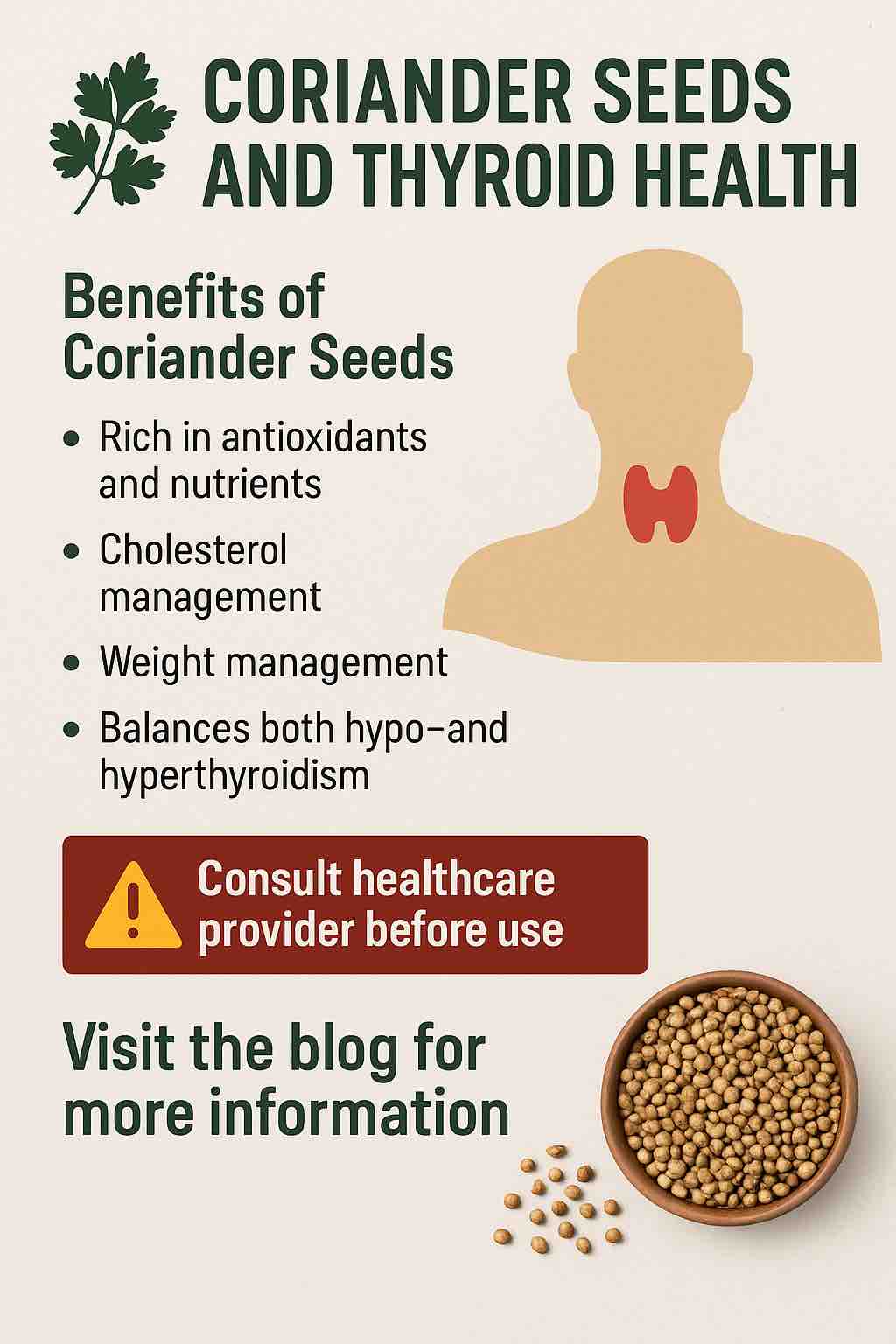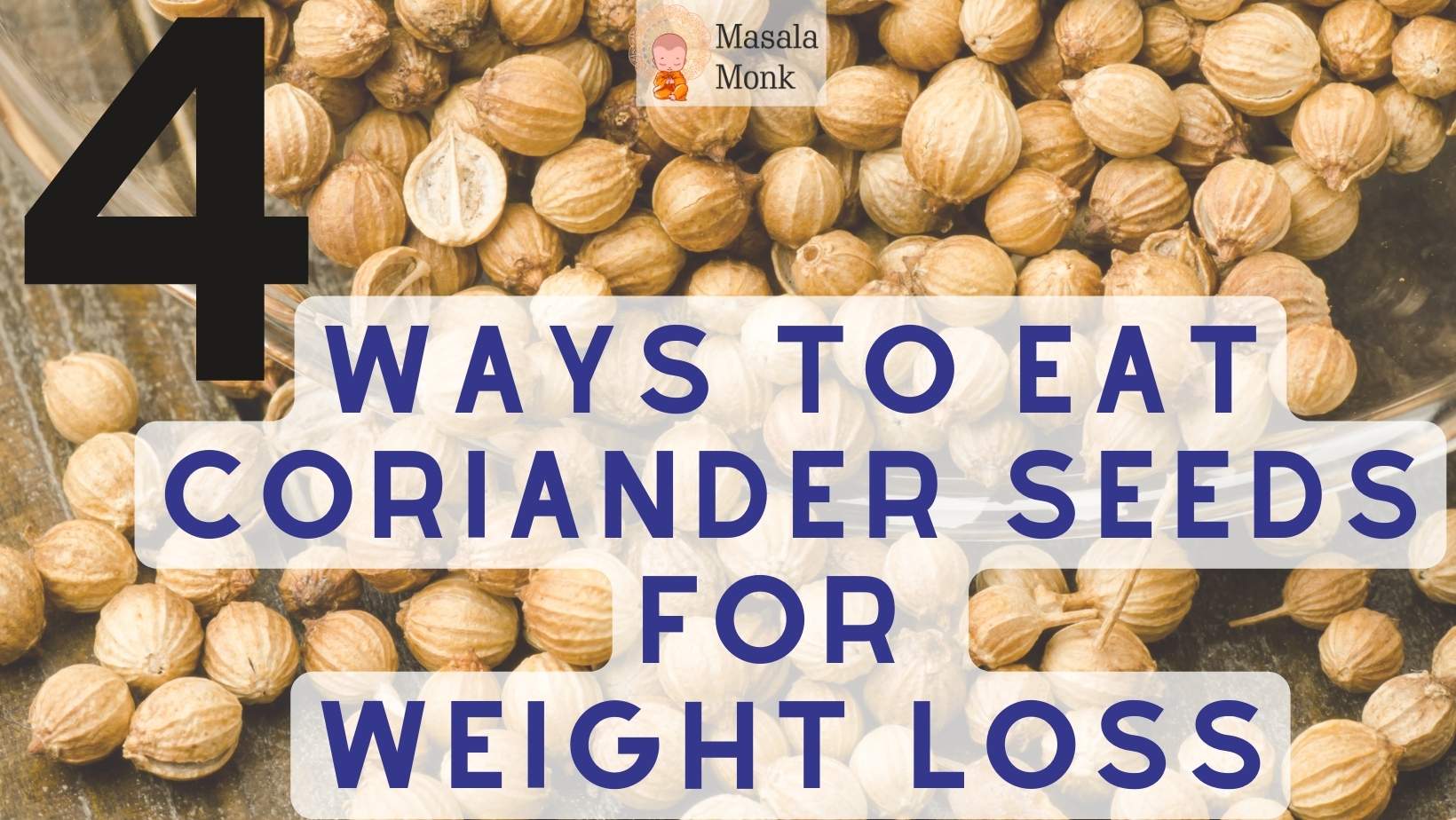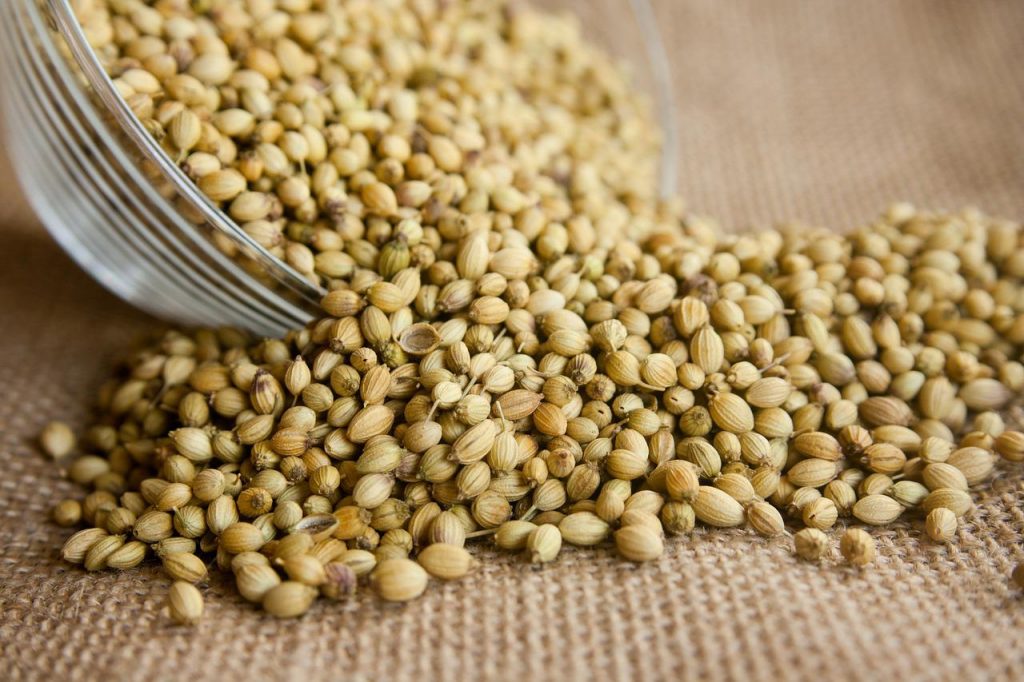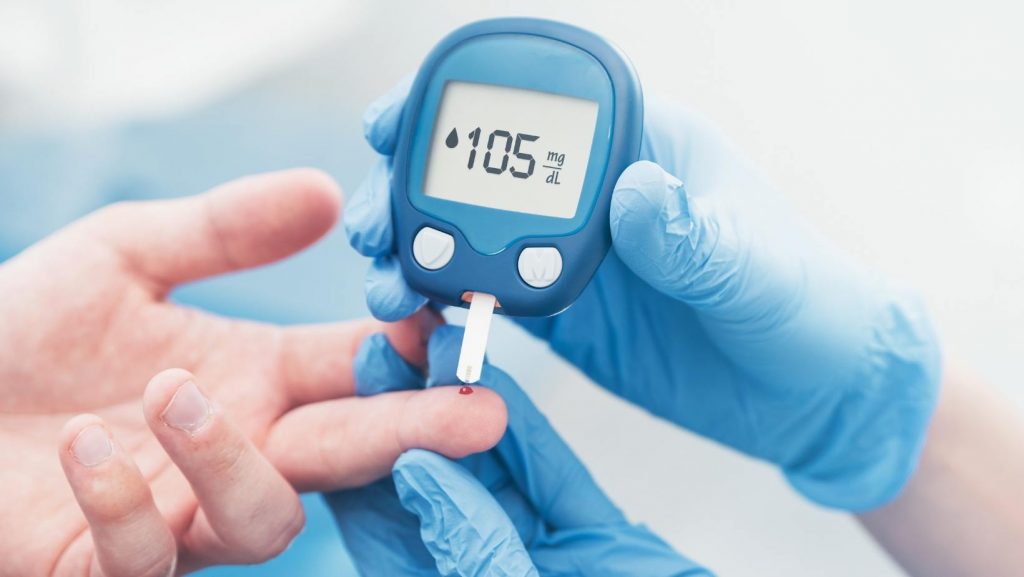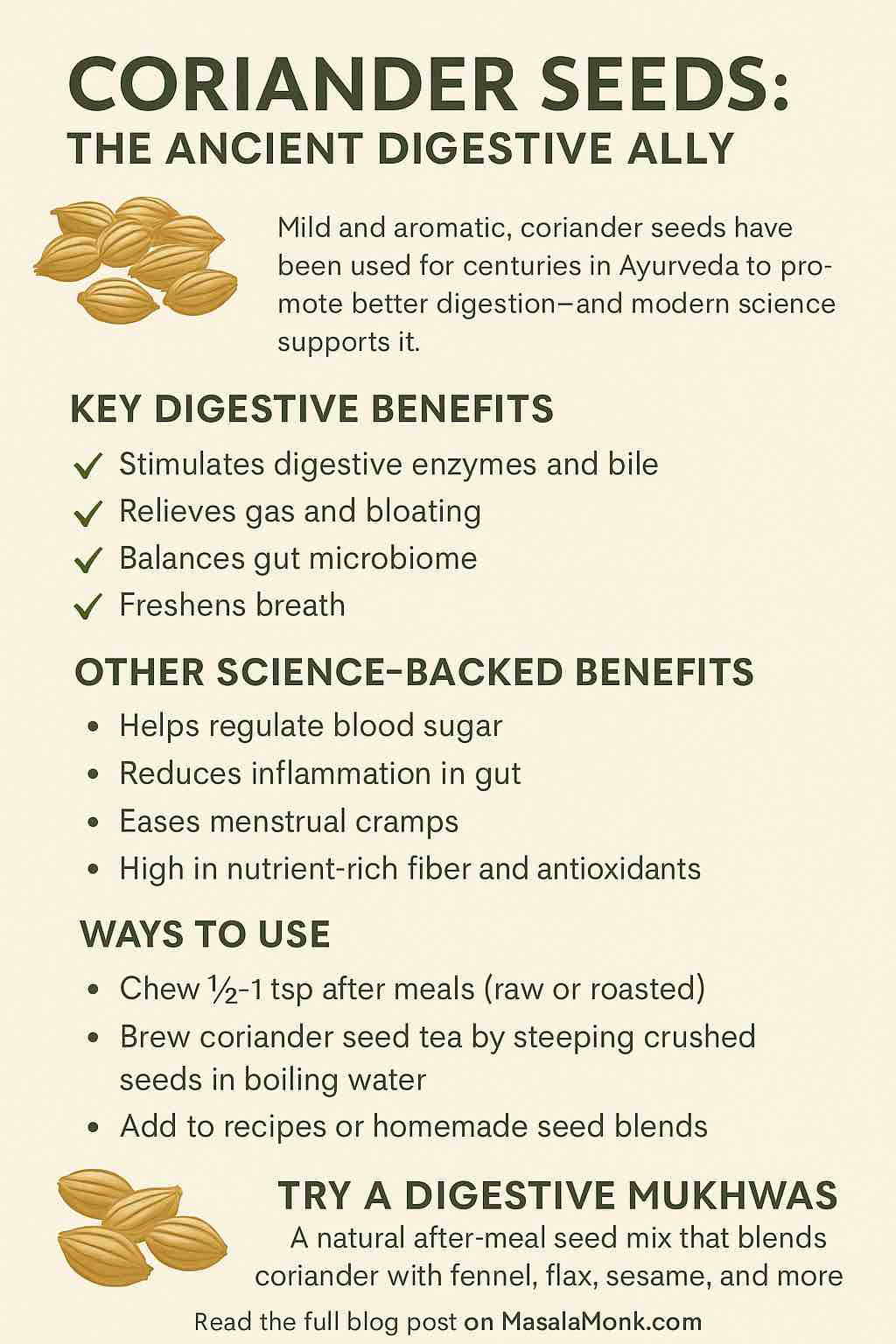
When it comes to simple, everyday foods that can quietly transform your digestion, coriander seeds are often overlooked — but shouldn’t be.
Mild, citrusy, and aromatic, these golden-brown seeds have been part of Ayurveda, traditional Chinese medicine, and Mediterranean diets for centuries. Now, backed by modern science, coriander seeds are proving to be more than a humble kitchen spice — they’re a legitimate digestive, anti-inflammatory, and metabolic aid.
Whether you chew them post-meal, brew them into tea, or enjoy them in a curated Digestive Mukhwas, coriander seeds offer gentle and lasting benefits for your gut, breath, and beyond.
🌱 What Are Coriander Seeds?
Coriander (Coriandrum sativum) is the dried fruit of the cilantro plant. While the leaves are often used fresh in cooking, the seeds are used in whole or ground form — for flavor and function.
They contain:
- Dietary fiber to support digestion
- Linalool, an essential oil known for digestive stimulation
- Flavonoids and antioxidants to reduce inflammation
- Minerals like iron, magnesium, and calcium
- Natural oils that balance gut motility and fight pathogens
🌿 In Ayurveda, coriander seeds are tridoshic — balancing Vata, Pitta, and Kapha — making them ideal for all body types.
🔬 Latest Scientific Backing for Coriander Seeds
1. Enhances Digestive Function
Coriander seeds stimulate the secretion of bile and digestive enzymes, making food easier to digest. They also help relieve gas and bloating through their carminative (gas-expelling) properties.
📚 A 2024 review by Oncquest Labs and Healthline confirmed coriander’s role in managing flatulence, sluggish digestion, and even post-meal heaviness.
2. Balances Gut Microbiome
Animal studies have shown that coriander:
- Improves gut morphology (structure and lining)
- Reduces harmful bacteria like E. coli
- Supports healthy microbial diversity
This has implications for people with IBS, indigestion, or chronic gut imbalance.
3. Helps Regulate Blood Sugar
Multiple studies confirm coriander seeds’ antidiabetic effects, improving insulin sensitivity and lowering fasting glucose levels in lab and clinical studies. This is especially helpful for managing post-meal blood sugar spikes.
4. Reduces Inflammation & Oxidative Stress
Rich in flavonoids like quercetin and tocopherols, coriander seeds offer antioxidant and anti-inflammatory effects — benefiting the gut lining, liver, and heart health.
5. Eases Menstrual Discomfort
Used in folk and Ayurvedic medicine for centuries, coriander seed tea is known to reduce menstrual cramps and bloating due to its muscle-relaxant and hormone-modulating effects.
🧘 Why It’s Great for Everyday Use
- Mild flavor that doesn’t overpower
- Cooling effect on the body
- Safe for regular use, even in sensitive digestive systems
- No sugar, caffeine, or artificial ingredients needed
🥣 How to Use Coriander Seeds at Home
✅ Chew them raw or roasted post-meal – Helps with digestion and freshens breath
✅ Make coriander seed tea – Boil 1 tsp crushed seeds in water for 5–10 min, strain, and sip
✅ Add to food – Toast lightly and add to lentils, chutneys, soups, or rice
✅ Blend into seed mixes – Pair with fennel, flax, and sesame for a classic after-meal mix
🧂 Want a Ready Blend? Try Digestive Mukhwas
If you’d rather skip the prep work and still reap the benefits of coriander, try a natural, small-batch Digestive Mukhwas — a traditional Indian post-meal seed mix that includes:
- Coriander seeds
- Flax seeds
- Fennel seeds
- Sesame, mango seed, turmeric, black salt, and more
💡 This formulation supports digestion, relieves bloating, and freshens the breath — without sugar or additives.
📌 Available now on MasalaMonk — a curated marketplace for high-quality, artisan wellness products.
MasalaMonk doesn’t manufacture this mukhwas but features it from trusted, small-batch producers who specialize in digestive-friendly formulations.
👉 Try the Digestive Mukhwas (Pack of 2) here:
🔗 https://masalamonk.com/product/digestive-mukhwas-pack-of-2/
⚠️ Precautions & Who Should Be Careful
- Generally safe for adults in culinary quantities (½–1 tsp per use)
- Those on diabetic medication should monitor blood sugar closely
- Avoid large medicinal doses during pregnancy without medical advice
- Rare allergies may occur — test small amounts if unsure
🧭 Final Thoughts
Coriander seeds are proof that you don’t need expensive supplements to support gut health and well-being. A small, consistent habit — like chewing seeds post-meal or adding them to your diet — can go a long way in keeping your digestive system calm, regular, and efficient.
Want to simplify the habit? Let a curated Digestive Mukhwas do the work.
👉 Shop the product here:
🔗 https://masalamonk.com/product/digestive-mukhwas-pack-of-2/
Your gut (and your tastebuds) will thank you.
✅ 10 FAQs – Coriander Seeds for Digestion & Wellness
- How do coriander seeds support digestion?
Coriander seeds stimulate bile and digestive enzyme production, helping break down food more efficiently and relieving gas, bloating, and heaviness. - Can I eat coriander seeds directly after meals?
Yes. Lightly roasted coriander seeds can be chewed post-meal for digestion and natural breath freshening. - What’s the best way to use coriander seeds for digestion?
Chew them raw or roasted, steep them in hot water for tea, or use them in a post-meal seed mix like Digestive Mukhwas. - Are coriander seeds the same as cilantro?
They come from the same plant. Coriander refers to the dried seeds, while cilantro is the fresh green leaf. - Can coriander seeds help with IBS?
Yes. Their antispasmodic and carminative properties can help reduce cramping and gas in IBS patients, though individual tolerance varies. - Is coriander safe for daily use?
Yes, when consumed in typical culinary amounts (½–1 tsp/day), coriander seeds are safe and beneficial for most people. - Do coriander seeds lower blood sugar?
Yes. Studies show coriander can support insulin activity and reduce fasting blood sugar, making it useful for those with mild imbalances. Consult a doctor if you’re diabetic. - Can I use coriander seed tea for bloating?
Absolutely. Coriander tea is a traditional and effective remedy for bloating, especially when combined with fennel or ginger. - What does coriander taste like?
Warm, nutty, and citrusy. It pairs well with other digestive seeds like fennel, flax, and sesame. - Where can I find a good blend that includes coriander seeds?
You can try the Digestive Mukhwas (Pack of 2), available via MasalaMonk – a curated marketplace offering small-batch, functional food products:
https://masalamonk.com/product/digestive-mukhwas-pack-of-2/


